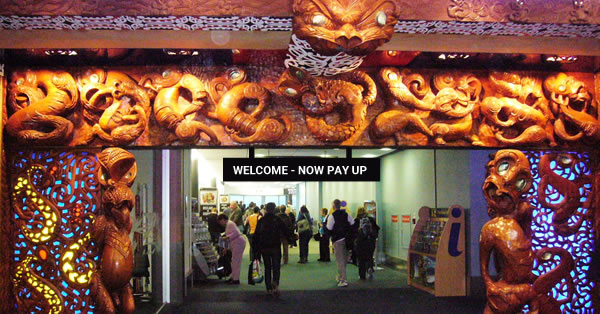It isn’t often that turkeys vote for Christmas, but the tourism industry has done just that, stating they are open to charging visitors to fund infrastructure. This is no doubt in the face of public pressure at the ever mounting tourist numbers and the smelly problems they leave behind. Prime Minister John Key has offered up $12m for local facilities.
However, the largest piece of tourism infrastructure we have in this country is not our public toilets. It is our natural environment, and that is similarly underfunded. A tourist tax could go a long way to solving these problems.
Through the Department of Conservation, the taxpayer currently spends just over $300m protecting our native species and maintaining things like tracks and huts.
Meanwhile tourism is our biggest export earner, tipping dairy at $13.5b. If we include domestic tourists the industry is closer to $30b.
Our main tourist attraction is nature – 41% of visitors come here primarily for nature, and virtually all visitors (85%) do a walk or trek while here. Walking has overtaken rugby as our national sport.
If you have an asset that generates a return – like your car, house or a machine – you invest in maintaining it. We’re not doing that with our main natural asset – at the moment DOC funding is around 1% of tourism revenue.
The needs are immense. Only DOC can comment on the shortfalls in hut and track maintenance, but we have some idea of the biodiversity challenge we face.
New Zealand has the highest rate of threatened species in the world. Around 81% of our birds, 88% of our reptiles and 72% of our freshwater fish are endangered. Most of our native species are not found anywhere else in the world – we have a global responsibility. The problem is that we are still losing the war.
Recent Government funding should stop the decline in kiwi numbers, but most other species are still on the downward trend. For example North Island kokako occupied 9% of our forest in the 1970s, but this is down to 2% now. This loss happens in the remote back country, and demands action on a massive scale.
But New Zealand has no active plan or strategy to prevent extinctions. DOC manages 30% of the country yet only has $20 to spend per hectare. There is lots of great work happening on the ground by Councils, community, iwi, OSPRI and DOC. But nobody, not even DOC, has oversight of saving our native species.
What would it take to prevent more extinctions? We need a plan, with funding and oversight.
How much funding is needed? In the long term new technologies will help make regions predator free so our native species can flourish. Short term the priority is just to stem the loss of endangered species. At the moment large scale 1080 drops are the only option – $25m more per year (not the one off drops we see at the moment) would control predators over 4m hectares of forest (half of DOC land). That would be enough to stabilise most native species while we work on a more lasting solution.
We also have huge problems with weeds, particularly wilding pines. We need to get on top of this problem before it gets unmanageable – $30m per year would do the trick.
That is roughly $60m per year needed to solve the immediate crisis. Over time as new technology emerges that money could be reinvested in ways that could help our environment flourish, rather than simply trying to hold the line.
The only question is how do we raise the cash?
Many other countries overseas charge tourists and citizens alike merely to enter their parks – in New South Wales the charge is $A190 per year. But let’s face it, most of New Zealand is a park. Why not just sting tourists at the gate and save the administration costs?
A $20 charge on all tourists entering the country would raise $60m per year. If the money is matched by locals there would be more than enough money to stem the loss of our native species, landscapes and invest in tourism infrastructure. Sound like a deal?
Tourism and nature need each other to flourish, which requires a delicate balancing act. This year’s EDS Conference ‘Wild Places’ will look more deeply that issue.
We still need a plan for saving our native species and someone in charge to coordinate all the disparate conservation efforts and make sure the money is spent in the best way possible. Most Kiwis probably think that is DOC’s job, but they are simply caretakers of their estate.
In the meantime let’s raise some cash to help us hold the line – a tourist tax makes sense.
Dr Marie Brown Geoff Simmons
Environmental Defence Society Morgan Foundation

